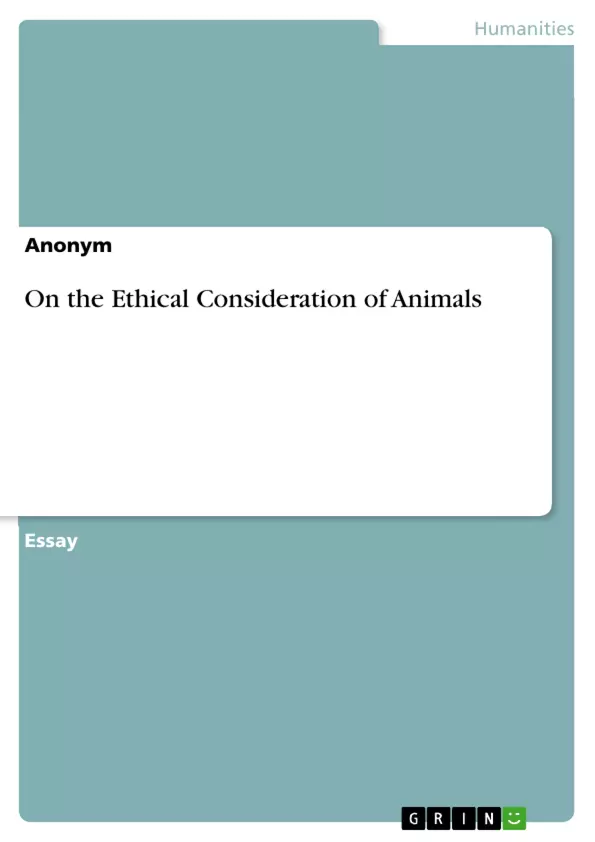This essay analyzes the ethical consideration of animals. Humans have the right to hurt or bring suffer to an animal, if they are able to provide a reasonable cause. This it is left up to humans, to decide, when it is acceptable to let a non-human animal suffer. It seems to be pretty complicated to define whether there is a reasonable cause or not. The fact that humans have this right in modern society, and where this right comes from, would be considered as the base for movements like the animal right movement. This essay will take a closer look at the development of these concepts and argue if non-human animals should be ethically considered.
The analysis of the human and non-human animal relationship and the question, if animals have rights, goes back to antiquity. The answer to this question involves a few factors, while the main factor is and was the position humans have in comparison to non-human animals. In history, most of the time, humans were put highly above non-human animals. This was mainly because of two reasons, which have been very constant for centuries. First, the God-likeness of humans and their ability to be reasonable.
It seems to be very random to claim that reason is connected to the ability of language or is necessary in order to have a mind. Non-human animals use language to communicate, but it is in a way that is beyond the understanding of humans. It is out of question that non-human animals can suffer and feel fear. If humans are such moral beings, this alone should be enough to not harm them.
Inhaltsverzeichnis (Table of Contents)
- Introduction
- History
- Alkmaion and the Concept of Soul
- Platon and the Domination of Nature
- Aristoteles and the Hierarchy of Nature
- Darwin
- Modern Times
Zielsetzung und Themenschwerpunkte (Objectives and Key Themes)
This essay explores the historical development of the concept of animal rights, focusing on the question of whether non-human animals should be considered ethically. It examines the philosophical arguments surrounding the distinction between humans and animals, particularly in relation to reason and consciousness.
- The historical development of the human-animal relationship
- The role of reason and consciousness in ethical considerations
- The influence of philosophical figures like Platon and Aristoteles
- The impact of Darwin's theory of evolution on ethical thinking
- The emergence of the animal rights movement and its key proponents
Zusammenfassung der Kapitel (Chapter Summaries)
- Introduction: This chapter introduces the ethical debate surrounding animal rights and highlights the traditional view of animals as lacking moral status. It also introduces the German animal protection law, which, while acknowledging animals as fellow creatures, still establishes a hierarchy with humans at the top.
- History: This chapter traces the historical roots of the human-animal relationship, starting with the ancient Greek philosophers. It explores the ideas of Alkmaion, Platon, and Aristoteles, highlighting their different views on the nature of soul and the human-animal distinction. These philosophers laid the groundwork for the dominant view that humans are superior to animals and have the right to use them.
- Darwin: This chapter examines the impact of Darwin's theory of evolution on the ethical debate. It argues that Darwin's work challenged the notion of human exceptionalism by demonstrating that humans are not fundamentally different from other animals. Darwin’s theory also suggests that reason and consciousness are not uniquely human qualities but rather evolved traits.
- Modern Times: This chapter explores the contemporary animal rights movement and the emerging perspectives on animal sentience and welfare. It highlights the work of Peter Singer and Jeremy Bentham, who argue that the ability to feel pain and suffering is a more relevant criterion for moral consideration than reason or language.
Schlüsselwörter (Keywords)
Key keywords and focus topics of this work include: animal rights, ethical consideration, human-animal relationship, reason and consciousness, soul, Darwinian evolution, utilitarianism, sentience, speciesism, and animal welfare.
Frequently Asked Questions
Should non-human animals be considered ethically?
The essay argues that the ability to suffer and feel fear should be sufficient grounds for ethical consideration, challenging the traditional view that only "reasonable" beings deserve moral status.
How did Darwin's theory of evolution impact animal ethics?
Darwin challenged human exceptionalism by showing that humans and animals share a common ancestry and that traits like reason and consciousness are evolved rather than uniquely human.
What were the views of Aristotle and Plato on animals?
Historically, philosophers like Aristotle and Plato established a hierarchy where humans were superior to nature and animals, justified by the human capacity for reason and a "divine" soul.
What is the "reasonable cause" in animal protection laws?
Modern laws often state that humans may only cause suffering to animals if there is a "reasonable cause," though defining what is "reasonable" remains a complex ethical and legal issue.
What is the main argument of the modern animal rights movement?
Led by figures like Peter Singer, the movement argues that "sentience"—the capacity to feel pain—is the only relevant criterion for moral consideration, regardless of intelligence or species.
- Citation du texte
- Anonym (Auteur), 2018, On the Ethical Consideration of Animals, Munich, GRIN Verlag, https://www.grin.com/document/457658



